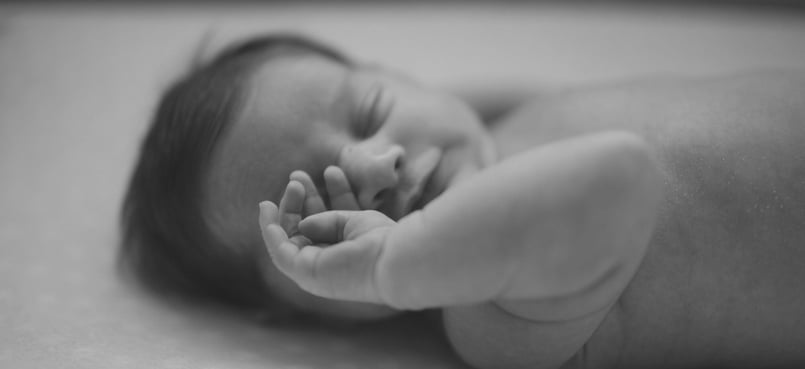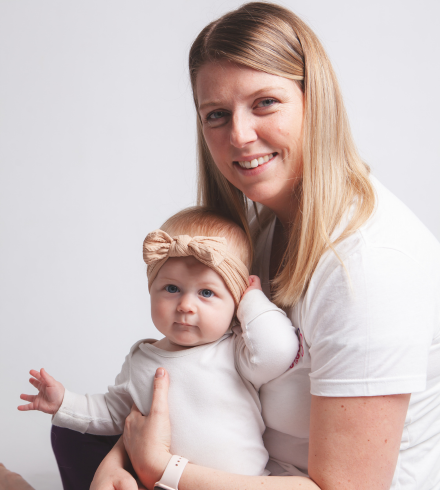
Hi I’m Lucy and I’m the owner of the Benfleet, Rayleigh and Rochford Basking Babies franchise. The topic of co-sleeping is a popular discussion amongst mums in my classes and I am also a qualified sleep consultant, so I wanted to address some of the more common questions surrounding it.
Co-sleeping is a topic that I get asked about a great deal as a sleep consultant and one where there is no ‘one-size fits all’ answer. Like with everything baby-related, it is every parent’s right to make their own choices regarding how their baby sleeps. But as the saying goes, ‘knowledge is power’. This is true when it comes to all aspects of parenting. If you have researched and made informed decisions, then it really is a case of doing what works for you and your family.
Co-sleeping - what is it?
Co-sleeping is when parents and infants/children sleep in the same bed. Many mothers and fathers from across the globe practice co-sleeping with their little ones. Co-sleeping is a contentious subject that can really divide opinions. So, what does the research say?
Should I co-sleep with my baby?
There are many arguments for and against co-sleeping with your baby. The Lullaby Trust, a British charitable organisation for safe infant sleeping, states:
“It is very much a personal choice so we would just advise you to read all the information on safer co-sleeping so you can make an informed decision. That way even if you decide not to co-sleep you can make your bed a safer place for your baby if you doze off accidentally.
There are some circumstances where we would strongly recommend against co-sleeping such as on a sofa or armchair, if anyone in the bed smokes or has drunk alcohol or the baby was premature or a low birth weight.”
Is it safe?
Co-sleeping can be safe if practised correctly. The main concern when co-sleeping is the risk of SIDs (Sudden Infant Death Syndrome). The important safety points to remember are:
-
Do not co-sleep if you or your partner smoke. This includes if you smoke in other parts of the house, or outside, as opposed to your bedroom.
-
Do not co-sleep if your baby was premature or had a low birth rate. (Born before 37 weeks gestation or weighed 5 ½ pounds or less).
-
Do not co sleep if you or your partner have been drinking alcohol.
-
Do not sleep with your baby on the armchair/sofa. Scarily, this can increase SIDs risk by 50 times.
-
When co-sleeping in bed with your baby, keep pillows, sheets, duvets and blankets away from your baby. This reduces the risk of them overheating or obstructing their breathing.
-
Try to keep co-sleeping to just you, your baby and your partner. Pets and siblings can cause further risk, so, if possible, avoid having your pets or other children in bed with you too.
-
Ensure baby is sleeping in a safe place where they are not likely to get trapped in a gap (for example between the mattress and wall) or fall out of the bed.
-
Consider co-sleeping after the age of 1. Some research suggests this is safer due to the SIDs risk decreasing dramatically from this age.
Co-sleeping can be a wonderful practise for both babies and parents if practised safely. So, if you feel it is right for you and your little one, ensure you follow the safety tips and advice.
Is co-sleeping beneficial?
Some research has shown that co-sleeping can be beneficial. In fact, it states that infants who co-sleep are less likely to cry and startle in the night than infants who sleep on their own. There are also physiological benefits with research stating that babies’ temperatures can be more stable and their heart rates more regular when co-sleeping. Other research even suggests that babies who co-sleep will have improved emotional health, less anxiety and a higher self-esteem. (Source: Benefits of Co-Sleeping | Ask Dr Sears).

Am I creating bad habits?
Again, this is a divisive topic. Whilst there is much research that shows that co-sleeping has huge benefits, some experts say that co-sleeping can create bad habits long term. Common reasons for parents wanting to stop co-sleeping are:
-
It can be disruptive to sleep. Sharing your bed can have an impact on the quality of sleep for you as parents (and sometimes children too). If no one is getting a good night’s sleep, it may be time to consider transitioning to solo sleeping. Experts recommend babies should sleep in the same room as their parents until they are at least 6 months old, but this does not mean you have to co-sleep.
-
It can be difficult as children get older. Sleepovers, residential trips with school and other events where your child may be away from you can become difficult if they have been used to co-sleeping.
-
It can decrease downtime. As parents, we all know how long and intense some days can be. Sometimes parents can become overwhelmed with no ‘downtime’ to relax and reset before another busy day of parenting!
Again, it is a case of weighing up the pros and cons of co-sleeping and deciding what is best for you and your family.
So, when should co-sleeping stop?
There are no hard and fast rules for stopping co-sleeping. My advice would be, when it is impacting on the quality of sleep for your family, it may be time to consider other approaches.
As parents, we automatically put the needs of our children before our own but equally, we can’t pour from an empty cup. If you feel that co-sleeping is impacting your sleep negatively it could be time to look at different approaches.
If I don’t co-sleep with my baby, will we have the same bond?
As conscientious parents we often question our choices. Are we doing the best for our children? Should I be approaching this in a different way?
There is no guide or rule book on how you parent and what choices you should make. You will absolutely have the same bond with your child, whatever you choose, so remember to choose what is best for your family!
About the author

